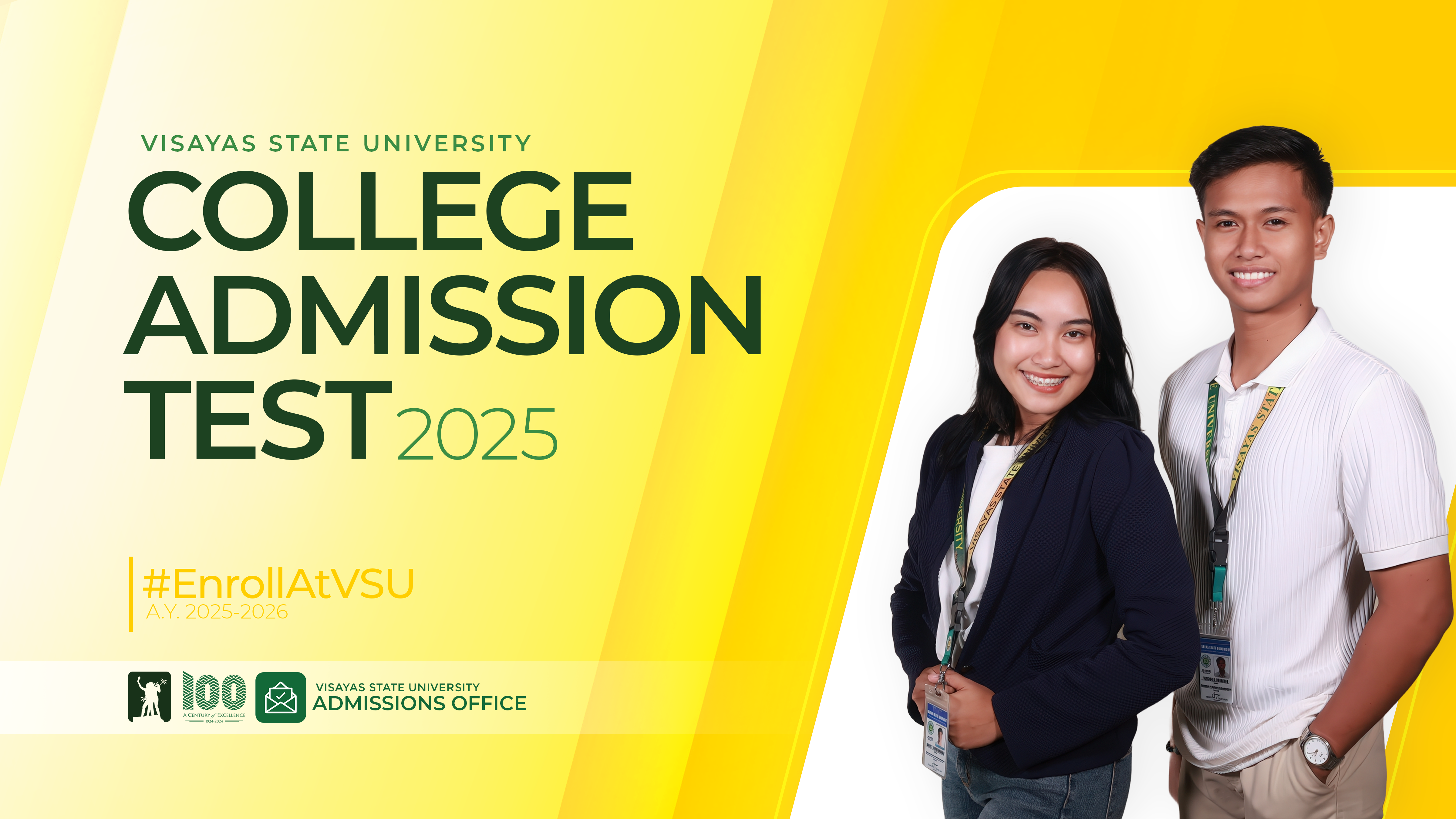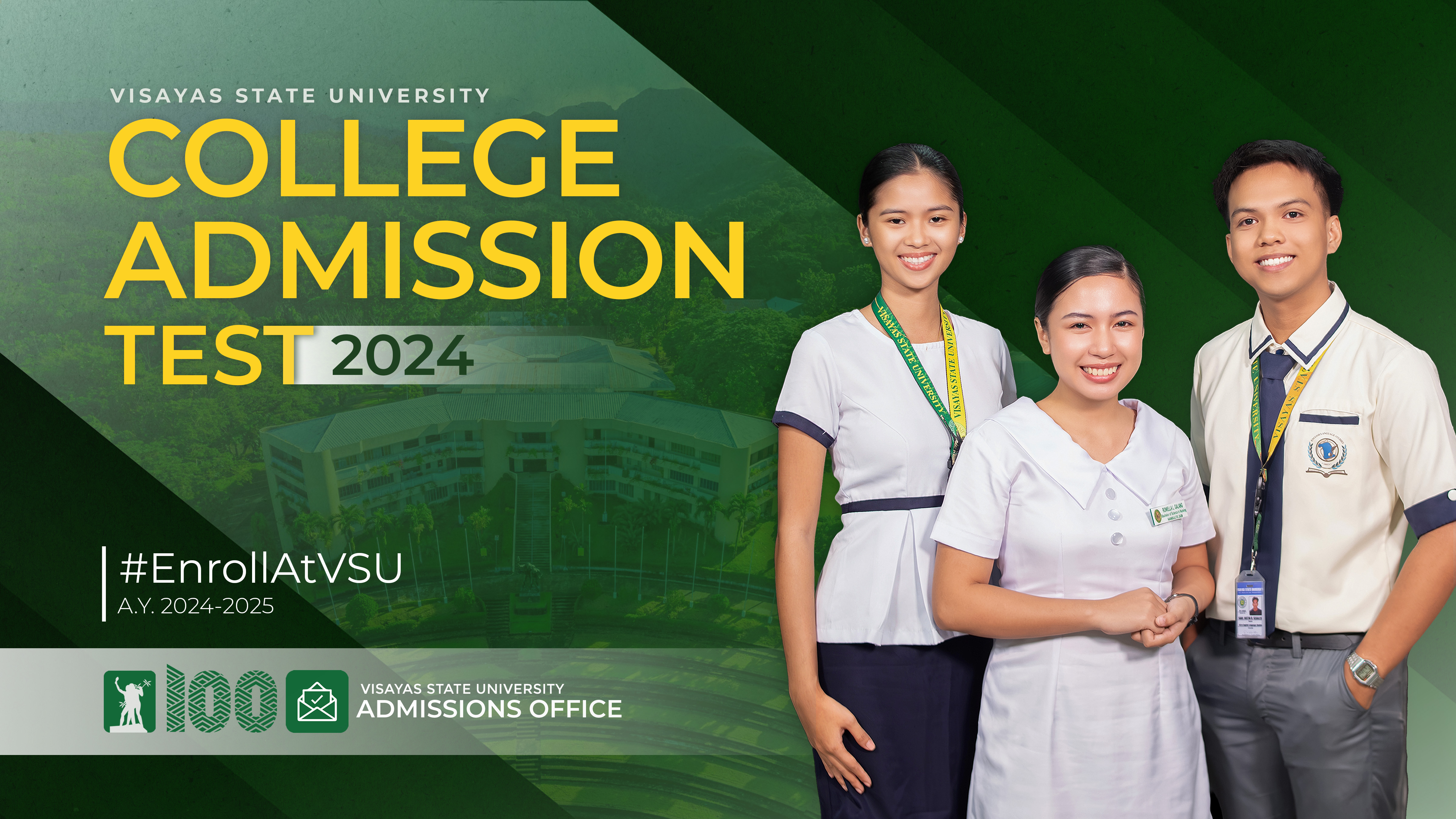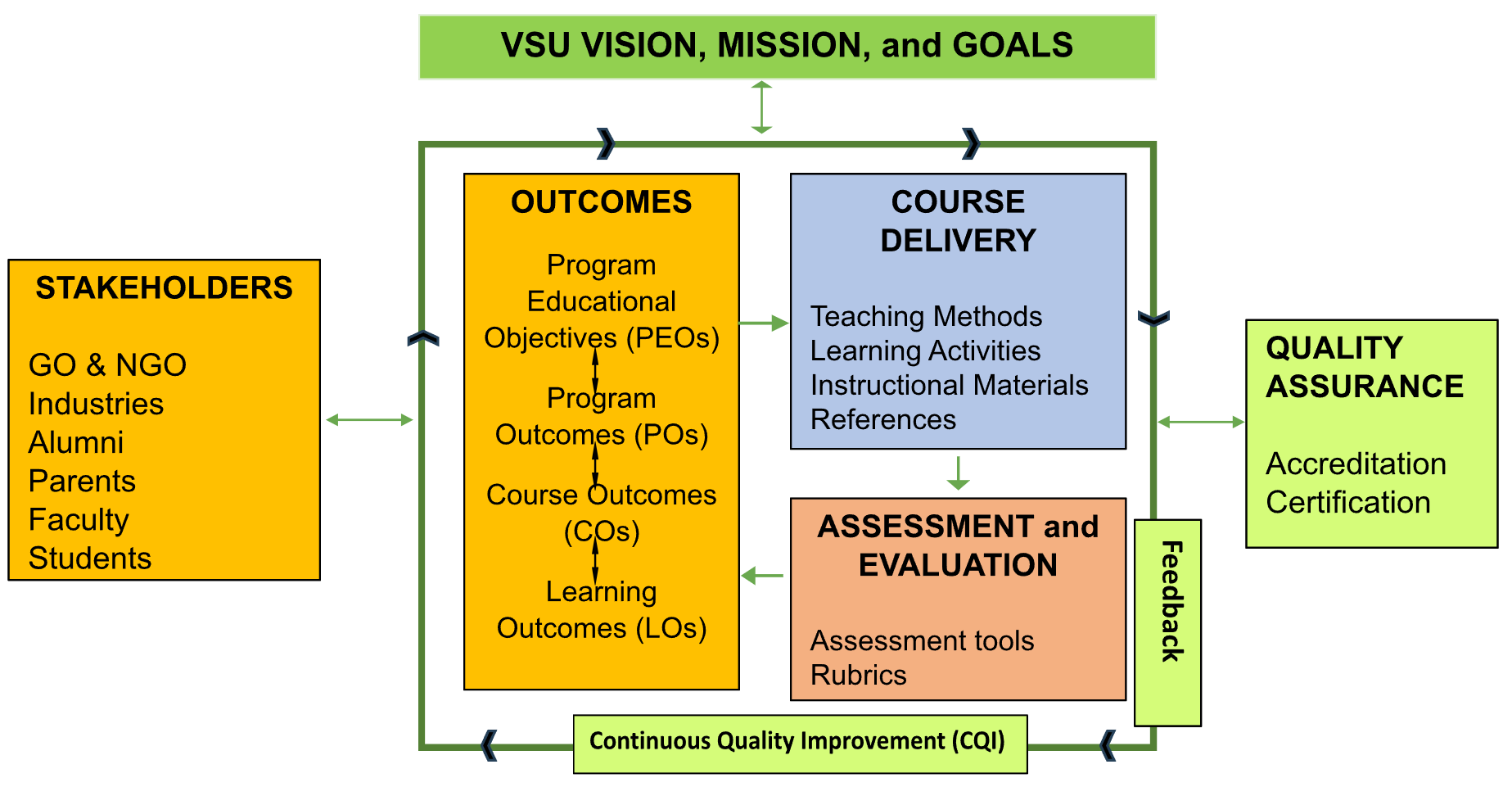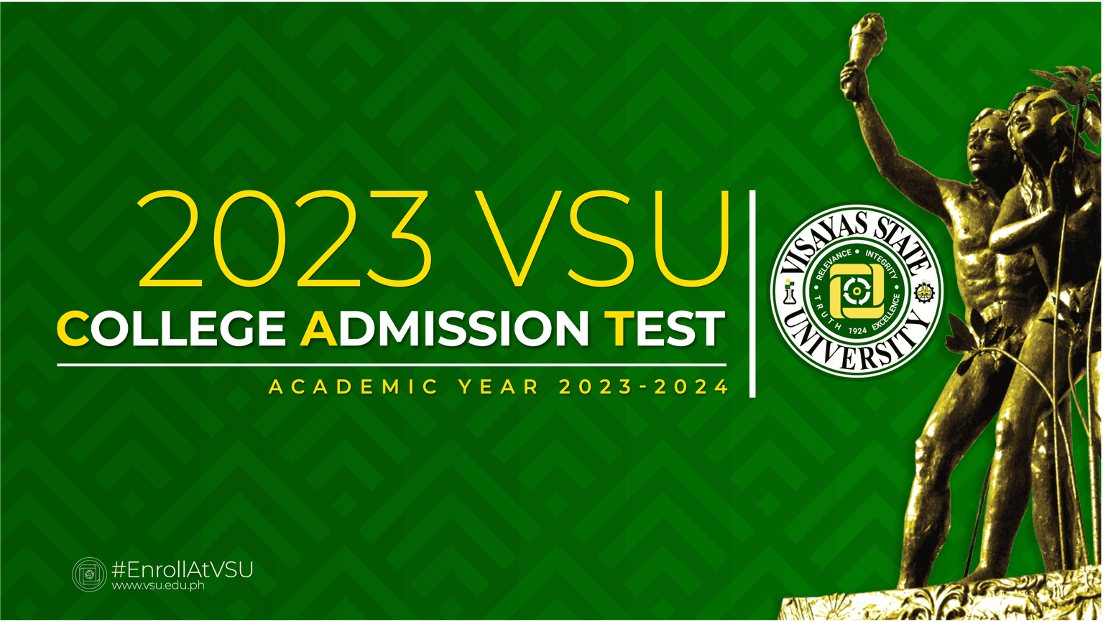Informational

VSU promises quality higher education in all of its undergraduate programs. Learn more about the programs, download the course checklists, and know about career opportunities and notable alumni.
Read more ...
CALENDAR OF ACTIVITIES |
| DATE | ACTIVITY | OFFICE TO CONTACT | |
| February 22 to April 13, Saturday | VSU Main, Isabel, Alangalang |
Admission Office and VSUCAT Proctors |
|
| March 15 to March 16, 2025 | Abellana National High School (Cebu) |
Cebu (4) |
|
| Carcar Central National High School (Cebu) | |||
| Carmen National High School (Cebu) | |||
| March 1 and 2, 2025 | Philippine Science Campus Central Visayas Campus | ||
| March 15 to March 16, 2025 | Dr. Cecilio Putong National High School (Tagbiliran City) |
|
|
| Sierra Bullones Technical Vocational High School | |||
| Central Visayan Institute Foundation Jagna, Bohol | |||
PROCEDURES AND REQUIREMENTS |
ADMISSIONS PROCEDURES
Step 1. Go to "https://cat2025.vsu.edu.ph/" and click the "Get Started" button.
Step 2. Read the Privacy and Consent form and click "I Agree".
Step 3. Input your active email address and click "Submit".
Note: Please check your email inbox for confirmation link after clicking the "Submit" button.
Step 4. Fill out the VSU Admission Application form.
Note: Always click "Save" before clicking the "Next" button.
Step 5. Review your information and click the "Submit" button.
Step 6. Please check your email for the details of your examination. Please take note of your schedule, testing center, examination link, username and password.
DOCUMENTS TO SUBMIT
Note:
1. For transfer students, you may upload a copy of your grades for all semesters taken if TOR is not available.
2. For transfer students who have only taken one semester in college, please upload your TOR/copy of grades and certification of your Grade 12 GPA.
3. For Social Category Applicants, you may present 4Ps ID instead of certification from DSWD
For Senior High School Graduating Students
-
- Certification of your grades with a computed Grade Point Average (GPA) from Grades 9, 10 and 11
- Any valid ID (School Id, Drivers license, Postal Id, Voters Id, National Id, Passport). If no valid ID, present voters’ certification.
For Senior High School Graduate
-
- Certification of your grades with a computed Grade Point Average (GPA) from Grade 12
- Any valid ID (School Id, Drivers license, Postal Id, Voters ID, National Id, Passport). If no valid ID, present voters’ certification.
For Alternative Learning System (ALS) Graduates
-
- ALS Accreditation and Equivalency (A&E) rating
- Any valid ID (School Id, Drivers license, Postal Id, Voters ID, National Id, Passport). If no valid ID, present voters’ certification.
For Transfer Students and Second Coursers
-
- Certified true copy of Transcript of Records (TOR)
- Certification of your grades with a computed Grade Point Average (GPA) from Grade 12 (applicable only for those who have taken only one semester in college)
- Any valid ID (School Id, Drivers license, Postal Id, Voters ID, National Id, Passport), If no valid ID, present voters’ certification)
For Applicants Under Social Category
-
- Certification/proof for any of your social category status (ex: solo parent's ID, Parents' 4Ps ID or certification from DSWD, Brgy. Indigency Certificate)
EXAMINATION PROTOCOLS
-
- Take note of your chosen exam date, time and testing center as indicated in the confirmation email we sent you.
- Arrive at the testing center at least 1 hour and 30 minutes before your scheduled time.
For example, if your exam is at 7:00 AM, you must be at the venue by 5:30 AM. - Wear appropriate attire during the examination. Wearing vulgar or indecent clothing is strictly prohibited.
- Prepare your valid ID for verification by admission office staff and proctors during attendance checking.
- The use of calculators, cellphones and other electronic devices is not permitted during the exam.
- Bring clean scratch paper for your mathematical solutions.
- Water tumblers and clear water bottles are allowed, provided they are positioned away from the computer units.
- Take note of your Moodle link, Username and Password. You may write them down on a piece of paper.
- Log in to the exam platform using the link and account credentials provided to you.
- Should you need assistance, do not hesitate to ask for help from the admission staff.
- Complete the exam. If you finish before the two-hour mark, notify your proctor, log out of the exam platform, and quietly leave the classroom.
Instructions for Examinees (Test Procedures)
-
- Upon entry at the VSU main gate, security personnel will check your email confirmation receipts together with your valid Identification Card.
- Please have your ID ready for verification. Make sure it matches the registration details you submitted.
- All electronic devices, including cellphones, smartwatches and calculators, are strictly prohibited inside the testing room.
- Water tumblers and clear water bottles are allowed, provided they are positioned away from the computer units.
Test Instructions
-
- The test is computer-based and consists of multiple-choice questions. You will answer questions directly on the computer.
- You will log in to the test system (Moodle) using the credentials provided.
- Bring extra papers if needed for calculations or notes. All materials must remain in the room after the test.
- The total time allotted for the test is 2 hours. Time warnings are flashed on your computer screen.
- If you encounter any technical issues or have questions about the test procedure, raise your hand, and you will be assisted.
- No breaks during the test. Have all your personal necessities (going to CR) before your scheduled time.
- If you need medical attention, inform immediately the assigned proctor for proper assistance.
- Review and complete the exam. If you finish before the two-hour mark, notify your proctor. Log out of the exam platform, then quietly leave the classroom.
- Should you need assistance, do not hesitate to ask for help from the Admission staff.
- Leave all scratch papers and ensure no test materials are removed from the room.
- Remain seated until instructed to leave. Exit the room quietly and follow the signs to the designated exit area.
| {{ dean.name ? dean.name : '' }} |
| {{ dean.designation ? dean.designation : '' }} |
| {{ dean.department }} |
| {{ deptHead.name ? deptHead.name : '' }} |
| {{ deptHead.designation ? deptHead.designation : '' }} |
| {{ deptHead.department }} |
Faculty Members |
||
|---|---|---|
|
loading please wait....
|
||
|
We're sorry, we're not able to retrieve this information at the moment, please try back later.
|
||
|
No records found.
|
||
|
{{ faculty.lastname ? faculty.lastname + ',': '' }}
{{ faculty.firstname ? faculty.firstname + ',': '' }}
{{ faculty.middlename ? faculty.middlename.slice(0,1) + '.' : '' }}
{{ faculty.middlename ? faculty.name_extension : '' }}
|
||
Pages: {{ meta.page }} / {{ pagination.count }}
| {{ dean.name ? dean.name : '' }} |
| {{ dean.designation ? dean.designation : '' }} |
| {{ dean.department }} |
| {{ deptHead.name ? deptHead.name : '' }} |
| {{ deptHead.designation ? deptHead.designation : '' }} |
| {{ deptHead.department }} |
Faculty Members |
||
|---|---|---|
|
loading please wait....
|
||
|
We're sorry, we're not able to retrieve this information at the moment, please try back later.
|
||
|
No records found.
|
||
|
{{ faculty.lastname ? faculty.lastname + ',': '' }}
{{ faculty.firstname ? faculty.firstname + ',': '' }}
{{ faculty.middlename ? faculty.middlename.slice(0,1) + '.' : '' }}
{{ faculty.middlename ? faculty.name_extension : '' }}
|
||
Pages: {{ meta.page }} / {{ pagination.count }}
| {{ dean.name ? dean.name : '' }} |
| {{ dean.designation ? dean.designation : '' }} |
| {{ dean.department }} |
| {{ deptHead.name ? deptHead.name : '' }} |
| {{ deptHead.designation ? deptHead.designation : '' }} |
| {{ deptHead.department }} |
Faculty Members |
||
|---|---|---|
|
loading please wait....
|
||
|
We're sorry, we're not able to retrieve this information at the moment, please try back later.
|
||
|
No records found.
|
||
|
{{ faculty.lastname ? faculty.lastname + ',': '' }}
{{ faculty.firstname ? faculty.firstname + ',': '' }}
{{ faculty.middlename ? faculty.middlename.slice(0,1) + '.' : '' }}
{{ faculty.middlename ? faculty.name_extension : '' }}
|
||
Pages: {{ meta.page }} / {{ pagination.count }}
The Visayas State University towards Sustainability
With its core vision of becoming a globally competitive university of science, technology, and environmental conservation, VSU is one with the United Nations in committing to the fulfillment of the 17 Sustainable Development Goals (SDGs) by the year 2030.
VSU is currently working to become a National Green University in the Philippines by championing sustainable practices in its five areas of instruction, research, extension, innovation and production services.
An important component of this plan is the integration of sustainable development practices into the curriculum of all undergraduate and graduate degree programs including in all research undertakings and projects, and even in pioneering student-led activities that will mainstream environmental conservation and protection efforts.
VSU is continuously working on promoting sustainable agriculture by investing in better research facilities and world class laboratory equipment to generate groundbreaking technologies and climate-resilient varietal improvements on some of its priority research commodities.
Aside from smart agriculture, the university also aspires to produce innovations that will address different environmental, agricultural, and economic issues that are not confined in its home region of Eastern Visayas but also to the other marginalized communities in different parts of the Philippines.
This site was created by the University Integrated Media Center (UIMC) to document and publicize all the many efforts conducted by the Visayas State University in terms of fulfilling the global goals.
The Visayas State University adopts the educational paradigm shift from the traditional teacher-centered to a student-centered system that is a continuous process of education wherein the curriculum, teaching strategies, learning activities, and assessment tools are improved continuously.
The VSU OBE framework is anchored on the CHED Implementation Handbook for OBE and ISA (2013) and the Plan, Do, Check, Act (PDCA) Cycle, which aligns with the VSU Quality Management System.
- Plan (Syllabus preparation) – At the start, inputs from the stakeholders are taken into consideration, and the learning outcomes are aligned with the COs, POs, PEOs, and VSU VMG. The syllabus reflects the achievement of all the outcomes.
- Do (Delivery of instruction) – Implement the course content and plan, teaching strategies, learning activities, instructional materials, and references for producing the needed outcomes.
- Check (Assessment and Evaluation) – Assess and evaluate by collecting data and analyzing it to determine the results. Feedback and comments are also obtained.
- Act (Continuous Quality Improvement/Accreditation) – Determine what needs improvement and program monitoring.
Moreover, the course outcomes (COs) are formulated based on the program outcomes (POs), which are anchored on the program educational objectives (PEOs), which are all aligned to the Vision and Mission of the University. One feature of the framework is the feedback mechanism for continuous quality improvement (CQI) of the program implementation, wherein all stakeholders are consulted to improve program design and implementation.
A variety of mechanisms are employed to continually assess and evaluate the attainment of COs, POs, and PEOs through examinations, projects, portfolios, exit surveys upon graduation, graduate tracer study 3-5 years after graduation, and employer feedback surveys, among others.
All undergraduate and graduate programs are also assessed by different local and international quality assurance bodies such as the Accrediting Agency of Chartered Colleges and Universities in the Philippines (AACCUP), CHED Office of Programs and Standards thru the issuance of Certificate of Program Compliance (COPC), Washington Accord, International Organization for Standardization (ISO), Times Higher Education (THE), QS Stars Ratings, among others. The assessment result may serve as input for CQI action to improve the quality of graduates.
ADOPTION PROCESS
The adoption of the Outcomes-Based Education (OBE) in the Visayas State University started when the Commission on Higher Education (CHED) issued CMO 46 s. 2012 entitled “Policy Standards to Enhance Quality Assurance (QA) in Philippine Higher Education through an Outcomes-Based and Typology-Based QA”.
Preparations for OBE implementation started in the College of Engineering in 2012 after its former Dean, Dr. Roberto C. Guarte attended a series of trainings and workshops in relation to their intention to subject their engineering programs to international accreditation. In-house trainings and workshops were then conducted first attended by the heads of academic departments, and later by the faculty members and student leaders of the College, preparing course syllabi, lecture guides and laboratory manuals following the concept of OBE. The College finally implemented OBE in the 1st Semester 2015-2016.
Thereafter, other colleges followed suit. Dr. Guarte conducted several in-house training-workshops on construction of OBE-compliant course syllabi to the faculty members of other colleges in the main campus. On some occasions, the University likewise invited resource persons from other universities outside VSU to further train the faculty on OBE.
In 2018, the University decided to go for ISO Certification of its Quality Management System. Part of the preparations is the full and strict implementation of OBE in all programs in the VSU system. To fully operationalize the plan, the University created a new office under the Office of the Vice President for Academic Affairs; the Office of the Director for Instruction and Evaluation (ODIE), which supervises the Office of Instructional Materials Development (OIMD).
A series of OBE seminars and training-workshops were again conducted in the university by the OVPAA, ODIE and OIMD, in addition to sending faculty members to training-workshops in other venues outside the university. OBE-syllabus making and updating has been a regular part of the VSU Faculty Onboarding activity organized by the OVPAA, ODIE and OIMD at the beginning of every school year.
By 2019, all curricular programs of the Visayas State University are implementing Outcomes-Based Education, and the university is continually improving its systems and procedures, including OBE.





